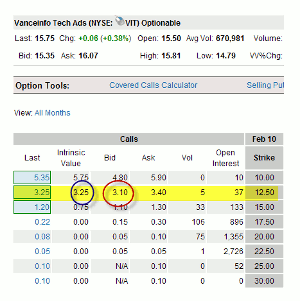Early assignment of your shares is rare, but possible, so understanding why and when it may occur will add to your bottom line success, writes Alan Ellman of TheBlueCollarInvestor.com.
When we sell a covered call option, we are undertaking an obligation for which we are well paid. Should the option holder decide to exercise that option, we must sell our shares at the specified strike price at or prior to the expiration date. This is the nature of American-style options as opposed to European-style, options which can be exercised only on expiration Friday.
For the most part, share assignment will not occur until after expiration Friday when the agreed upon strike price is below the current market value. For example, if we sold the $50 strike and the current value of the stock is $52, the option holder or brokerage will exercise that option and achieve a $2 per share profit. Expect almostall options that are $0.01 or more in-the-money to be exercised.
Why Aren’t Most Options Exercised Early?
Option value consists of intrinsic + time value. Early exercise will result in the holder surrendering this time value, so it rarely occurs. The option owner may sell the call to capture the time value but early exercise and purchase of our shares does not make sense if there is significant time value remaining. It’s true that the shares can be purchased and then sold at market to capture intrinsic value but why not just sell the call and benefit from both time and intrinsic value? This concept applies to I-T-M and at or near-the-money strikes as O-T-M strikes would rarely be exercised. There are some rare exceptions as described in a recent article I published.
How Is It Determined Which Shares Are Assigned if Early Assignment?
This is a completely random process whereby the Options Clearing Corporation (OCC) decides to which brokerage the assignment will be given and the brokerage will then pass it on to one of its clients.
Why Does Early Assignment Occur?
As time value declines, the chance of early assignment increases. There are times when the calls trade below the intrinsic value, and in these cases, the chance of early assignment is much greater. This will occur when the strike is deep I-T-M. Let’s look at the options chain for VIT, as an example:

Options chain for VIT
Click
to Enlarge
NEXT PAGE: When to Avoid Assignment
|pagebreak|Early Assignment Possible for $12.50 Call
Note that the intrinsic value of the $12.50 call is @ $3.25 (since the stock price is $15.75) and yet the bid or our sale price of the option is $3.10 (red circle). Not only is there no time value for this option but it is actually trading below the intrinsic value. The last sale was @ $3.25 which is actually the exact amount of intrinsic value. The $15 strike, on the other hand, has time value of $0.35 ($1.10 – $0.75). As your strike moves deeper I-T-M, the chance of early assignment increases.
Other Factors That May Lead to Early Assignment
1.Dividends- When your equity is about to distribute a dividend, early assignment is possible for strikes when that dividend value is greater than the time value remaining for that option. This will take place prior to the ex-dividend date or the date share ownership is required to be eligible to capture this dividend. This is the most common reason for early assignment. Here is a link to a free site that tracks these dates:
2. High Open Interest - When you see thousands of open contracts we know that the institutional players are involved. Their trading costs are near zero and their arbitrage opportunities are greater than ours when time value approaches zero.
3 Pinning the strike- when puts and calls are near the money on expiration Friday, there is a tendency called pinning the strike for the stock to move to the strike price or slightly beyond. This may result in assignment (not early, but unexpected) after the bell. This can also take place if there is a report or late news coming out the day of expiration.
When to Avoid Assignment
1. To generate more cash (mid-contract) - If there is little or no time value remaining in our option (sold), why not unwind our position? Buy-to-close the call and sell the stock thereby re-capturing the intrinsic value of the premium. Now take that bundle of cash and re-invest it in another covered call position. Remember, covered call writers are tough “bosses.” No vacations or days off for our cash. They are put to work at all times during normal market conditions.
2. To avoid tax consequences - If your cost basis is much lower than the current market value of your shares, assignment may result in an unfavorable tax consequence. In these cases, you will want to close or roll your calls before assignment. If your shares are unexpectedly assigned, you can purchase new shares at market and inform your broker that these new shares are to be the ones associated with the assigned option. Please check with your tax advisor and brokerage on these matters.
Conclusion
Early assignment of your shares is rare, but possible. Understanding why and when it may occur will further add to the bottom line of your investment success.
By Alan Ellman of TheBlueCollarInvestor.com










